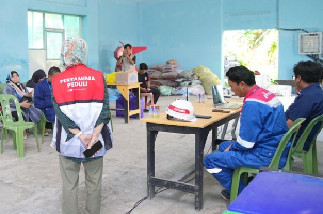Empowering rural communities through hydrothermal diaper waste processing
A CSR initiative by Pertamina Patra Niaga in South Sulawesi
DOI:
https://doi.org/10.24252/sociality.v4i2.59206Keywords:
community empowerment, CSR program, diaper waste, hydrothermal processing, rural sanitationAbstract
Improper management of disposable diaper waste remains a persistent environmental concern, especially in rural areas where public awareness and infrastructure are limited. Previous studies have often overlooked community-based educational interventions focused on diaper waste processing. This study aims to improve community knowledge on waste separation and disposable diaper waste management through a targeted empowerment program in Kelurahan Tamalabba, South Sulawesi. Conducted as part of the CSR initiative of PT Pertamina Patra Niaga IT Makassar, the program involved 20 residents of RW 4 and employed a combination of socialization, interactive discussions, and hands-on training. Baseline data revealed only 20% of participants had good knowledge of diaper waste handling. Following the intervention, this figure increased to 75%, indicating a substantial improvement. This study demonstrates the effectiveness of hydrothermal technology as a feasible solution for diaper waste processing in rural settings, while simultaneously emphasizing the role of participatory education in fostering environmental responsibility. These findings highlight the potential of localized CSR-supported programs to enhance public health outcomes by addressing unmanaged sanitary waste in underserved areas.
References
Ahmad, R. P., & Halomoan, N. (2022). Kajian timbulan sampah popok sekali pakai di Kabupaten Karawang. Jurnal Teknik Lingkungan, 8(1).
Budiarto, R., et al. (2023). Pengenalan pengolahan sampah popok bayi sekali pakai menjadi media tanaman hias dalam pemberdayaan masyarakat untuk pengelolaan limbah rumah tangga. Jurnal Pengabdian, Riset, Kreativitas, Inovasi, dan Teknologi Tepat Guna, 1(2).
Helmi Putri, et al. (2023). Workshop pengolahan sampah pampers menjadi media tanam di Desa Perboto sebagai upaya peningkatan nilai guna sampah. Jurnal Pengabdian dan Layanan Kepada Masyarakat, 2(1).
Juhaidah, S., et al. (2019). Pengelolaan sampah TPA Tamangapa Kota Makassar. Planning for Urban Region and Environment, 8(3).
Khotimah, S., Nasruddin, N., Santi, H., Padly, A., & An-Nafi, A. (2023). Community empowerment through the 3R movement and the establishment of a waste bank in Wirittasi Village. Journal Transnational Universal Studies, 1(11), 919–927. https://doi.org/10.58631/jtus.v1i11.70
Kristyawan, I. P. A. (2017). Pengolahan sampah dengan teknologi hidrotermal. Jurnal Riset Lingkungan, 10(1), 45–50.
Musiana, M., Ishak, S., Soamole, M., & Surasno, D. (2024). Analysis of community-based waste management policies to achieve clean and healthy environment. West Science Interdisciplinary Studies, 2(4), 749–753. https://doi.org/10.58812/wsis.v2i04.784
Naldi, A. (2023). Interaction analysis of youth participation with the household waste management system regarding the existence of local waste treatment facilities. ICESE, 1(1). https://doi.org/10.61511/icese.v1i1.2023.186
Nasrokhatun, B. (2020). Hubungan antara tingkat pengetahuan dan kebijakan pengelolaan sampah popok sekali pakai dengan jumlah timbulan sampah yang dihasilkan pada anak di bawah 3 tahun (batita). Journal of Public Health Innovation, 10(1).
Norgitasari, S., & Qurniyawati, E. (2017). Pemakaian diapers terhadap perilaku temper tantrum pada anak usia toddler. Global Health Science, 2(2).
Nurhayati, E., & Nurhayati, S. (2023). Community waste management education: Strategies and impacts. Jurnal Dimensi, 12(3), 677–686. https://doi.org/10.33373/dms.v12i3.5582
Pratama, A., Kamarubiani, N., Shantini, Y., & Heryanto, N. (2021). Community empowerment in waste management. https://doi.org/10.2991/assehr.k.210508.015
Schenck, R., Chitaka, T., Tyrrell, H., & Couvert, A. (2023). Disposable diaper usage and disposal practices in Samora Machel Township, South Africa. Sustainability, 15(12), 9478. https://doi.org/10.3390/su15129478
Safril, T. S., Indrawan, B., & Yoshikawa, K. (2017). Commercial demonstration of solid fuel production from municipal solid waste employing the hydrothermal treatment. International Journal of Environmental Science, 2.

Downloads
Published
How to Cite
Issue
Section
License
Copyright (c) 2025 Andi Ade Ula Saswini, Muhammad Haris, Panji Triyanu Hermawan, Nur Inayah Rauf

This work is licensed under a Creative Commons Attribution-NonCommercial-ShareAlike 4.0 International License.

